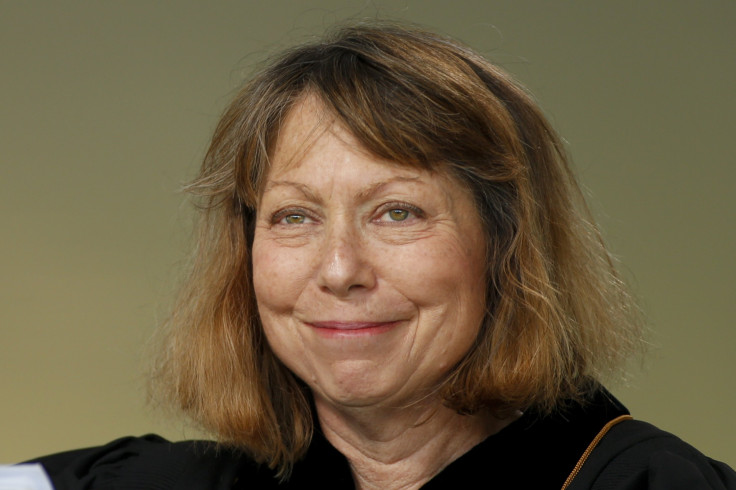Jill Abramson Will Review Book Content After Plagiarism Accusations

Former executive editor of the New York Times, Jill Abramson, denied allegations that parts of her newly published book, “Merchants of Truth: Inside the News Revolution” – which was based on the evolution of journalism – was plagiarized, even as fresh accusations pour in.
“I certainly didn’t plagiarize in my book,” Abramson said in an interview Wednesday on Fox News segment “The Story With Martha MacCallum.” "There are 70 pages of footnotes showing where I got the information. Many people from Vice have been taking issue with the book. I think they don’t like the portrayal of Vice, although I think it’s a very balanced portrayal.”
Despite her clear denial on the show, she took to Twitter hours later and wrote she "endeavored to accurately and properly give attribution to the hundreds of sources that were part of my research" and that she took "seriously the issues raised and will review the passages in question."
The latest person who accused her of plagiarizing his work was a freelance journalist from Brooklyn, Ian Frisch, who took to Twitter to draw comparisons between portions of his article from the time he used to write for Relapse Magazine in 2014 and Abramson’s book.
“I'm just...I don't know. Devastated? This is just crazy. I'm just showing these screenshots so people know. I have articles to write and a book coming out in three weeks, so I have bigger s*** to worry about. But shame on you, Jill. Shame on you,” he said, drawing attention to his upcoming book “Magic Is Dead: My Journey Into the World's Most Secretive Society of Magicians,” Frisch wrote in one of a series of tweets.
— Ian Frisch (@IanFrisch) February 7, 2019
— Ian Frisch (@IanFrisch) February 7, 2019
— Ian Frisch (@IanFrisch) February 7, 2019
— Ian Frisch (@IanFrisch) February 7, 2019
— Ian Frisch (@IanFrisch) February 7, 2019
Frisch added that the article he cited as evidence against Abramson was his exclusive reporting available on his personal website alone. Hence in order to have access to it, she must visit the site. He also did not agree with her explanation about footnotes that she gave in her apology.
When journalist Bob Ruggiero tried to defend Abramson, Frisch refused to back down from his claim.
Ian, I have the book in front of me. @JillAbramson fully credits you in the sources section (see photos). What’s the plagiarism? pic.twitter.com/ox5Zh0y3I6
— Bob Ruggiero (@BobRuggiero2) February 7, 2019
To me, these endnotes are incomplete, and do not cite the breadth in which my reporting was used. Also, she quotes Thomas in all but one instance as if he is speaking to her directly.
— Ian Frisch (@IanFrisch) February 7, 2019
Abramson was initially accused of plagiarism by Vice News Tonight correspondent Michael Moynihan who also posted several screenshots Wednesday on Twitter, which claimed that she had lifted off other writers’ works. He admitted he had only read portions which mentioned the news outlet he worked for, but was able to detect mistakes and plagiarized content in them.
“*All three* chapters on Vice were clotted with mistakes. Lots of them. The truth promised in ‘Merchants of Truth’ was often not true. While trying to corroborate certain claims, I noticed that it also contained...plagiarized passages,” he wrote.
The following examples from the final book—not the galley—are only from the Vice chapters (I didn’t check the others). So let’s begin...Here is Abramson on Gavin McInnes (whom she interviewed) and the Ryerson Review of Journalism https://t.co/hx0XcyZ89k pic.twitter.com/qroN59gyVk
— Michael C Moynihan (@mcmoynihan) February 6, 2019
This passage, on former Vice News editor Jason Mojica, is lifted from a 2010 Time Out magazine piece, with small modifications: https://t.co/csNoONZQhX pic.twitter.com/aiQzwKEStl
— Michael C Moynihan (@mcmoynihan) February 6, 2019
This paragraph can be sourced to two places: a *masters thesis* and a 2013 New Yorker piece by Lizzie Widdicombe https://t.co/ZWX5RgKxlahttps://t.co/Ux6gdDO9Qg pic.twitter.com/tSIKyRoKDP
— Michael C Moynihan (@mcmoynihan) February 6, 2019
This example is from one source--the New Yorker again--though the two sentences are separated by a page.https://t.co/Ux6gdDO9Qg pic.twitter.com/m3dnsQaOmv
— Michael C Moynihan (@mcmoynihan) February 6, 2019
Here Abramson--in a treatise on journalistic ethics--copies a passage from...the Columbia Journalism Reviewhttps://t.co/mZZlA4odqw pic.twitter.com/gZVxQ1dc3Z
— Michael C Moynihan (@mcmoynihan) February 6, 2019
There’s lesser stuff too; still problematic. At various points in Merchants of Truth, rather than toil in the archives, reading old issues of the magazine or watching old Vice videos, Abramson liberally borrows from those who have: https://t.co/Ux6gdDO9Qg pic.twitter.com/mEvufhFJ3J
— Michael C Moynihan (@mcmoynihan) February 6, 2019
“There’s plenty more--enormous factual errors, other cribbed passages, single or unsourced claims--but this should give a sense,” he concluded, adding, “The book ends with a final wag of the finger, reminding me that my colleagues apparently don’t possess 'the expertise to compete on the biggest news stories.' If Abramson is the arbiter of ethics & expertise, I think we’re doing just fine.”
© Copyright IBTimes 2025. All rights reserved.






















